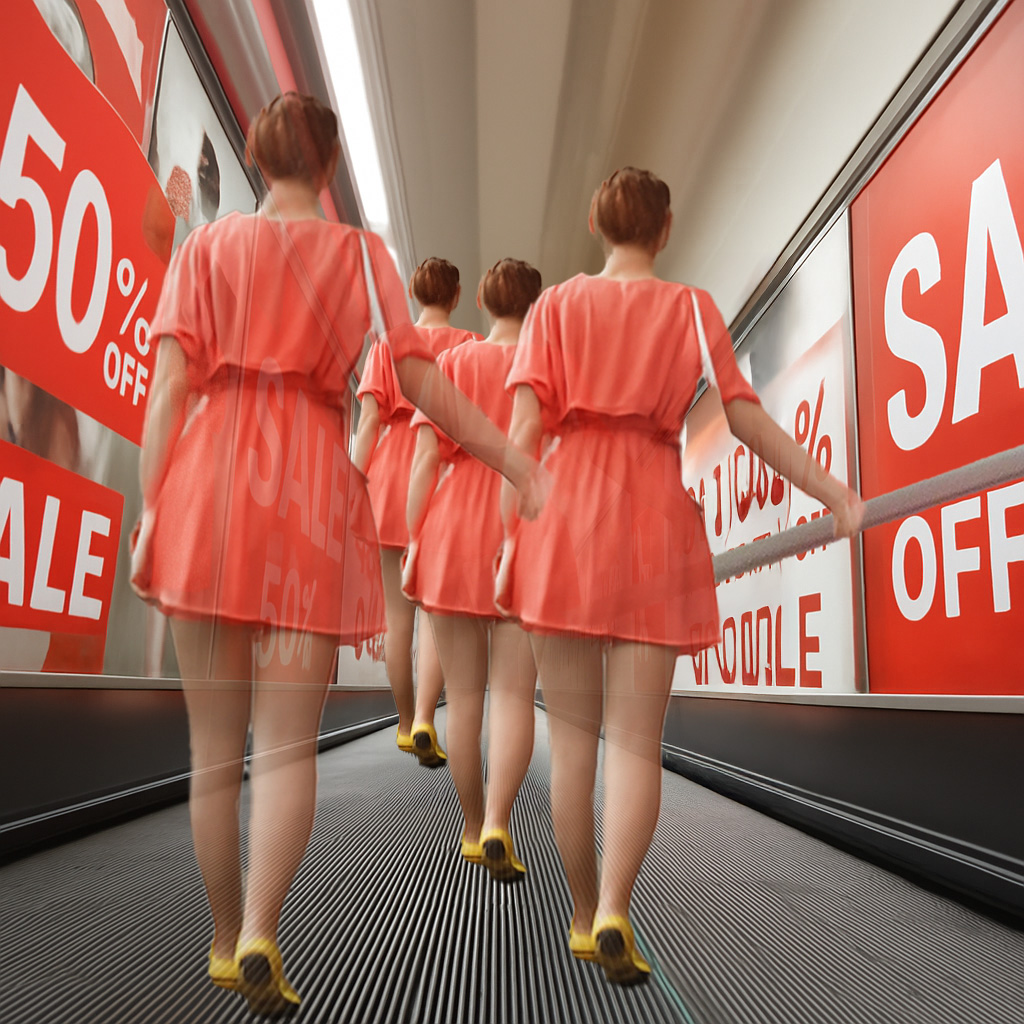The Culture of Becoming
The self-help industry sells improvement. Not in the quiet sense of growth, but in the endless choreography of becoming: more confident, more productive, more focused, more whole. But it is not alone. Across advertising, branding, wellness, lifestyle, tech – the same message repeats, dressed in different packaging: You can be more than this
Or just as often: This confirms who you are.
Aspirational Products
Buy these sunglasses – become someone mysterious, desirable, and hard to reach.
Buy this electric car – become ethical, modern, and quietly superior.
Buy this subscription – become optimised, strategic, and too busy to question it.
Get a Brazilian butt lift – become the algorithm’s idea of femininity.
Plan your own funeral – become the kind of person who thinks of everything.
You are being told that who you are now is inadequate. This is how desire is created – and then shaped into need. You are not just buying things, you are buying into a cult of aspiration.
The mechanism is simple: compare your present self to a better one, always out of reach.
Then sell you the bridge to achieve it.
Identity as Commodity
It is identity, not function, that is being sold. And the market has expanded to include everything. Not just what you wear, but how you think. Not just what you own, but how you rest. Not just your preferences, but your personality. Even your refusal – to buy, to post, to conform – becomes an aesthetic, a brand.
But not all consumption points forward. Some of it looks inward – a search for confirmation, not transformation.
You buy the thing not to become someone else, but to declare yourself: I’m the kind of person who buys vinyl. Who shops locally. Who drives electric. Who reads the right books. These purchases act as proof – that you are aligned, ethical, informed, conscious. The product becomes a mirror, reflecting back an identity you already believe in.
And so the consumer does not just accumulate things – they accumulate overlays, multiple versions of themselves. They shop not for objects, but for versions of who they are or could become: more extroverted, more assertive, more desirable.
Every purchase is a performance of taste, ethics, status, or mood. You are never just drinking coffee. You are signalling something about your priorities, your body, your politics. You’re not just wearing trainers – you’re walking an identity.
Aspiration is Permanent
But this horizon of becoming constantly shifts. Aspiration is never meant to be satisfied – or the system would collapse. It is meant to stretch forward, endlessly. New goals, new upgrades, new selves. Capitalism survives not by fulfilling desire, but by renewing it.
The Consumer’s State
The machine makes no moral judgment. It simply creates wants and needs, then offers the illusion of fulfilment. Everyone is fed the same story: that there is a better version of you waiting – if you just buy it now.
The consumer is always in a state of becoming, reaching for aspirations. In this state no one is really satisfied, and everyone is ready to buy. They just need the right offer.
Artist Context
This text reflects the critical terrain of my art practice, which engages with the machinery of consumer aspiration and the commercial construction of self. My work often takes the form of altered mannequins, flyposting, and object-based installations that mimic the aesthetics of retail while questioning their deeper social function.
Bibliography
Ahmed, S. (2010). The promise of happiness. Duke University Press.
Baudrillard, J. (1998). The consumer society: Myths and structures (C. Turner, Trans.). Sage. (Original work published 1970)
Bauman, Z. (2007). Consuming life. Polity Press.
Ehrenreich, B. (2009). Smile or die: How positive thinking fooled America and the world. Granta.
Fisher, M. (2009). Capitalist realism: Is there no alternative? Zero Books.
Goffman, E. (1959). The presentation of self in everyday life. Anchor Books.
Han, B.-C. (2015). The transparency society. Stanford University Press.
Illouz, E. (2008). Saving the modern soul: Therapy, emotions, and the culture of self-help. University of California Press.
Rojek, C. (2001). Celebrity. Reaktion Books.
Rushkoff, D. (2013). Present shock: When everything happens now. Current.
Tolentino, J. (2019). Trick mirror: Reflections on self-delusion. Fourth Estate.
Zuboff, S. (2019). The age of surveillance capitalism: The fight for a human future at the new frontier of power. Profile Books.
